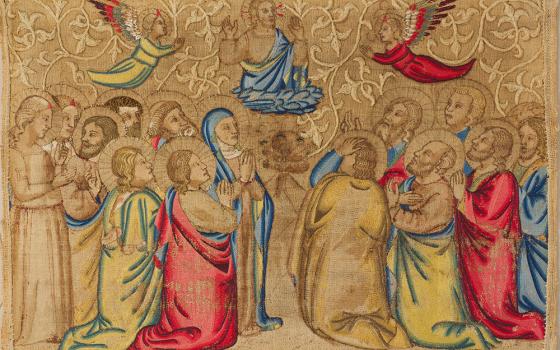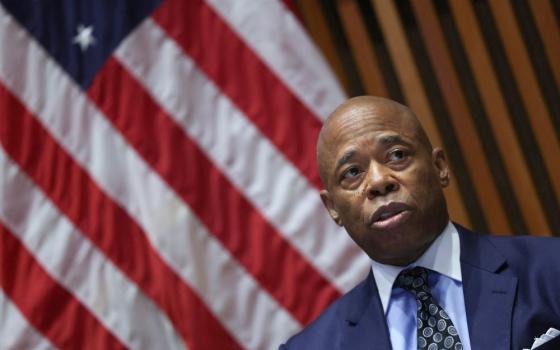As I begin the reflections on the Scriptures tonight, I first of all wish to thank all of you for inviting me to celebrate with you these 60 years of you being a parish family, 60 years of being part of the community of disciples of Jesus, being the light to the nations here in this area of the Archdiocese of Detroit. As we celebrate this, we find that first of all, we have to do as St. Paul suggests in our second lesson tonight, "Look back at those who laid the foundation," as Paul said he had done for that church in Corinth.
|
Fourth Sunday in Ordinary Time |
He had laid the foundation, and he points out that if it's going to be a community of disciples of Jesus, the foundation has to be Jesus. But then others come along and build on that foundation. That is what has gone on here now for these 60 years. The foundation was laid very well and has been built upon now for 60 years. All of us who are gathered here tonight and the members of the parish family who are not here -- we are the ones that carry on the work of this community of disciples.
We thank God for those who have gone before us, but we also look to the challenge that is presented to us as we carry on this work and continue to build on that foundation which is Jesus. I think we will find as we reflect, first of all on the passage from the book of the prophet Isaiah, that we are being challenged to carry out the work of Jesus. When I read that passage from Isaiah, I am always reminded of an article that was published in The Boston Globe quite a few years ago, back in 1989.
It was published the day after the six Jesuits, who were on the faculty of the University of Central America, were dragged out of their rooms into the garden of their home, thrown on the ground (and also the two lay women who were hiding at their home), and were shot and killed, brutally. But the next day in The Boston Globe appeared the article that had been written by the rector of the university—Father Ignacio Ellacuría.
He had written it some time previously because he and the other Jesuits at the university were under attack. And you know, I'm sure, Archbishop Oscar Romero, who is now Blessed Oscar Romero, together with the church under his leadership, these Jesuit priests and their coworkers were trying to bring about justice for the poor. They were trying to bring about a revolution, but not a violent revolution.
They were trying to bring about fundamental, radical change in the economic structures of that country. The structures that kept the vast majority of the people in desperate poverty. As Archbishop Romero used to proclaim, "So many are so poor; so few are so rich, and that's not right." The Jesuits were leaders in trying to bring about that change, and they experienced much opposition. An article had been written about them that condemned them for being too violent, too destructive, and too utopian.
The university had already been bombed 14 times. They themselves had been threatened and almost killed previously. So Fr. Ellacuría, when that article was published, felt he had to respond and he did. In the beginning of his article he said, "We Jesuits, in trying to bring about change in this country, are not too violent, too destructive. We're against violence. We reject all violence, but we are trying to bring about change."
He said, "Perhaps, if anything the writer of that article says is true about us is that we're too utopian because we are people of the Gospel," the Gospel of Jesus -- the good news proclaimed to the poor. That good news that calls us to transform our world into as close an image of the reign of God as possible. That's what we are called to do: transform our world into as close an image of the reign of God as possible. And what does the reign of God look like?
That's what you hear the prophet Isaiah proclaiming: "The Spirit of God is upon me because God has anointed me to bring good news to the poor. God sent me to bind up broken hearts, proclaim liberty to captives, to set the downtrodden free, to give the blind new sight, and to proclaim God's year of Jubilee." There you have the reign of God described. Good news for the poor -- their lives are going to be changed. They will have a chance for a full human life -- what everyone on this planet has a right to: water, food, clothing, healthcare, education, and a place to live. Everyone has a right to those.
That's good news to the poor. Set the downtrodden free -- those who are persecuted, tortured, killed -- they're given their freedom. God's year of Jubilee -- do you know what that means? In the Jewish tradition, every 50 years there was the Jubilee year. That was a time when debts were forgiven; wealth was redistributed so that everyone could have a chance for a full human life. That's what it will look like when the reign of God happens.
Do you remember the Gospel from last Sunday when Jesus, this is in Luke's Gospel, for the first time, goes into the synagogue near the beginning of his public life? He comes back to Nazareth, his hometown, and goes into the synagogue. They hand them the scroll of the Scriptures. He unrolls those Scriptures until he finds the place where Isaiah says, "The Spirit of God is upon me." Jesus reads that passage. It was last Sunday's Gospel.
Do you remember what he said at the end? After he read that passage of Isaiah, he rolled up the scroll, handed it back to the leader of the synagogue, and sat down. Luke said, "All eyes were fixed on him." Then Jesus began to speak, "This day, this Scripture passage is fulfilled as you listen." What's he saying? He's telling us he has come to make the reign of God happen, transform our world into the reign of God where all people -- every part of creation is under the dynamic rule of God's love. That's the reign of God. Our world will be transformed as that reign of God becomes reality.
"But what will it take?" That's what Fr. Ellacuría said about the work of the Jesuits and the church under Oscar Romero in El Salvador. "We proclaim the good news. It may seem foolish, utopian to many people, but it's the message of Jesus. We are called to transform this world into as close an image of the reign of God as possible."
So as we gather together as God's people, we are those who continue to build on the foundation that was laid previously 60 years ago in this place.
The foundation of the church was laid over 2,000 years ago when Jesus sent out the first disciples. We are the ones that are called to continue to build up that reign of God, transform our world. You know, we're blessed today, I think, in our church in a very special way because of Pope Francis. Isn't he a clear image of one who has listened to this Word of God and who is determined to try, by what he says, but even more by what he does, to show that the poor are the ones that we reach out to first?
Pope Francis is always talking about going to the peripheries where the poor are, and that's what he does.Within Vatican City, when some of those first refugees fled violence and economic disorder in the Middle East and came to Italy in that boat, which capsized on the Island of Lampedusa, just off of Italy, the next day where did the pope go? Immediately he went to welcome those immigrants, those refugees and to reach out to them who were suffering.
They were fleeing poverty and violence and persecution. Francis went immediately to be with them. He has told us over and over that we must welcome the stranger. It's the message of Jesus. We must also give up violence. That's the message of Jesus. We have to find a way to peace in our world without killing, without violence.
Just as Pope St. John Paul II, Pope John Paul I, Pope Paul VI, Pope St. John XXIII have proclaimed in the last 60 years, so now does Francis proclaim, "War never again! No, never again war! It only destroys the lives of innocent people. It throws into upheaval the lives of those who do the killing. It always leaves behind a trail of hatred and resentment to make it all the more difficult to solve the very problems that provoked the war."
Do you remember what Francis did about two months ago when he traveled to the Central African Republic? This is a country in the heart of Africa where there is much poverty -- one of the poorest countries on the continent, but also violence. The violence was between Christians and Muslims killing one another. Francis, when he got there in the capital city, he made a trip to the mosque. People warned him not to go, "You'll be killed."
He went, not with arms, of course. He went to meet and talk with the imam to discuss ways that Christians and Muslims could come together under the one God whom we all worship, come together in peace. In those weeks since, they've begun to build peace in that country because Francis was willing to risk his life, yes, but to reach out in love. That's what we must try to do.
That's the challenge that is given to us as we gather together as the parish family of St. Lucy and pledge ourselves now to continue the work that was begun 60 years ago to build on that foundation, which is what Paul says is Jesus and his message. We must build on that. If we listen to the last part of what St. Paul wrote in that passage to the church at Corinth, we will be encouraged and understand that we can do it; we can be changed and committed. "Do you not know that you are God's temple and that God's Spirit abides in you?"
If that's true, and it is, that's what we're celebrating. Certainly through God's Spirit we can enter into the work of Jesus to transform our world into as close an image of the reign of God as possible. We won't only be stones in the temple because as Jesus said in the Gospel looking around at those who sat there, "Here are my mother and my brothers and sisters. Whoever does the will of God is brother and sister and mother to me."
Jesus lives in us; Jesus can guide us. Jesus can give us the courage and the strength to enter into the work that he began when he said, "The reign of God is near. Proclaim the good news. Transform our world into as close an image of that reign of God as possible." That's what the parish family of St. Lucy is called to do as you move into the next phase of your life as the family of God, brothers and sisters to Jesus.
[Homily given at St. Lucy's Parish, St. Clair Shores, Mich., during Mass in honor of their 60th anniversary of the founding of the parish. The transcripts of Bishop Gumbleton's homilies are posted weekly to NCRonline.org. Sign up here to receive an email alert when the latest homily is posted.]







